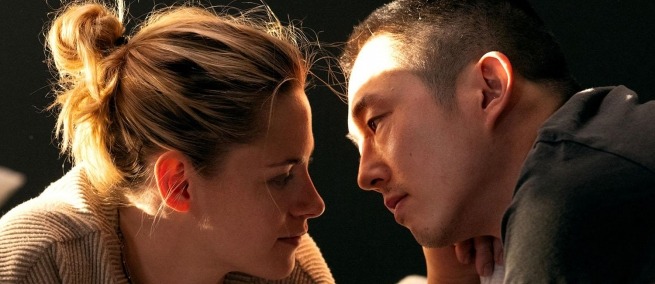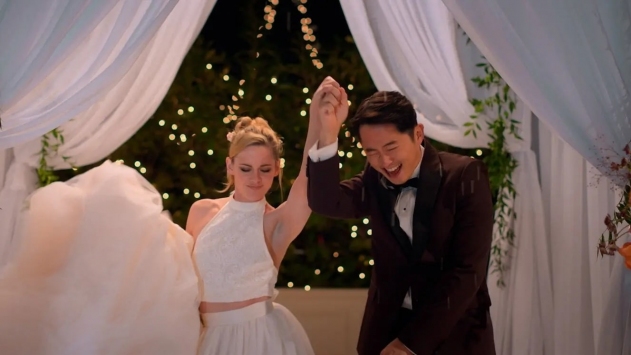
Winner of the Sloan Feature Film Prize at the 2024 Sundance Film Festival, LOVE ME is a romance written and directed by Sam and Andy Zuchero starring Kristen Stewart and Steven Yeun. Stewart stars as an AI-powered buoy, and Yeun as an AI-powered satellite who find each other over the internet after humanity has gone extinct. The two create a shared reality. LOVE ME is currently in theaters via Bleecker Street. We spoke with the Zucheros from their home in California about the movie’s conception, working with science advisors, and artificial intelligence.
Science & Film: To start, why did you pick a buoy to be one of your main characters? In what ways was water important to you?
Sam Zuchero: We wrote this during the pandemic, so we felt really far away from everybody. Down on Topanga Beach, when you go down the canyon, there's a little buoy that sits way out in the ocean on the horizon. We would look at her–I call it her–when we came down the canyon and associate because we couldn't see our family, we couldn't see our friends, we on our own little island.
Andy Zuchero: We started thinking about the Voyager that we sent into space and the Pioneer plaque, which was a reference in the movie as well. Sagan was a whole reference in the film. The movie starts with the first 4.5 billion years of Earth playing out with this little pale blue dot rotating, and then our existence is just this little blip. Then it goes quiet again. It was a direct reference to Carl Sagan's pale blue dot quote from Cosmos where he talks about the need to be kinder to each other and the need to cherish this one little rock that we have, this one little dot in all of space that we can't escape from, and how important that is. And I mean, you look at it, it's pale blue, it's tiny, it's made of water, and it's the only home that we've ever known.
SZ: And then shooting into space [like we did with Voyager] what we think of ourselves and how we represent ourselves and what we are, and just letting it kind of float around up there. It was a fun idea to play with.
AZ: The movie takes place over the course of 10 billion years, the life of Earth, as the Sun becomes a red giant. It starts in this nuclear winter where the oceans are frozen. We actually shot an animatronic buoy on an icy lake in Canada. And then as the Earth thaws, we find the buoy in a world that's endless water, and then as the sun gets bigger and bigger and encroaches Earth, all the water dries up, and she finds herself on this desolate, barren, arid rock. We took her to Death Valley to shoot that. It's sort of watching the Earth transform over this expansive timeline, and then to watch and to mirror the characters' transformation at the same time. The Earth is working as a metaphor for how the main character feels about herself; when life is new, everything is wet and exciting and filled with life. But as she starts to doubt who she is that water dries up and she finds herself alone on this arid rock.
SZ: We're living right now on land that used to be underwater. We find fossils around all the time. We were reading a lot of books about extinction events and dinosaurs with our son at the time too. So we were thinking a lot about what a place that we are sitting in right now has looked like over the course of the planet's life.

Still from LOVE ME. Courtesy of Bleecker Street.
AZ: Our son was dino-obsessed, and while we were writing the film he made us go to the Museum of Natural History twelve times. There's no way not to ponder your own fleeting existence...
SZ: Kristen is really obsessed with water. She has a whole water theme in her life. Her movie, her debut that she's directing, is called A CHRONOLOGY OF WATER. And she just is a very fluid person, somebody that can change and morph and move through things with force and ease.
S&F: Did you work with any science advisors on the film?
SZ: Oh yeah, that was one of the most fun parts!
AZ: Well, we adore this group, the Science and Entertainment Exchange. There was Lindy Elkins-Tanton from the University of Arizona, who also just launched Psyche, which is a satellite that was launched by NASA and JPL to go explore Venus. She's brilliant, and she made a whole grid while she was procrastinating from grading papers one day about what that opening 4.5 billion years of Earth should look like, what you would actually see. So that was her shot. Another astrophysicist, John Cramer of Washington State University, simulated the sound of the Big Bang. During the Big Bang, the Universe was so compact that sound could actually travel through the medium of space. And so there was a sound associated with that, and you can hear the echoes of that through electromagnetic radiation that's still pulsing through the universe. He managed to simulate that, and we took that exact sound he simulated and put it at the beginning of the movie to stretch the time span from the 10 billion years of Earth to the 13 billion years that the universe has been around.
SZ: Whenever we can talk to a scientist about our ideas, we jump on the opportunity. A lot of times they're like, well, that would never happen. We're like, use your imagination. And they're like, Okay. [laughs]
S&F: At what point in the process did you engage with these folks? Screenwriting? Production?
SZ: We had written the script, and we were working on the animatic. So for all the buoy satellite stuff, we did an animation to make sure that we could actually accomplish what we were imagining, and the personification of these objects and how they would communicate with each other.
AZ: It's really when we get stuck.
SZ: Yeah, research is like the lifeblood of screenwriting. Whenever you don't know what to do, you just pick up a book or interview somebody who's in the field or watch something. It just fills your brain.
S&F: The other thing I wanted to be sure to ask you guys about is the technology and this idea of sentience or physical embodiment. The trajectory of the film is quite amusing in the sense that they're essentially setting up house, and in some ways it's kind of surprising, because you're like, well, they could do anything. Can you talk about that choice and how you wanted to portray it?
SZ: It was really freeing when we decided to set it in the apartment, and to focus on the emotions of these characters and what they were going through. Because you can go anywhere, but just bringing it down to: we're all stuck in these little places we live in, what are we going to make of this little hole we've created ourselves? Because we are just humans. I mean, we all think humans are so powerful and so capable, and you know, we are, but we're also just nothing. We're also just in our little spaces, and we have to make love and life and happiness where we are for ourselves. So that was really freeing.
As far as AI goes, we always say that we used AI as a lens to look at ourselves. We read all the books, all the positive AI books about sentience and all that. Ultimately, I don't think that AI will ever gain sentience, but will be able to manipulate humans' emotions quite well. And they'll be their own thing, or their own alien life form that we've brought here to Earth somehow.
AZ: There was a draft of the script where they were traveling through space and time together in a virtual simulation meeting Marco Polo, Einstein, Joan of Arc, and all those folks. But we really made a choice to make a movie that made you feel big and small at the same time. Or at least that was our intention. The canvas that the movie is playing on is this huge journey of Earth over billions of years, but the love story at the center, we really wanted to feel fleeting and intimate and compact, so that it feels spontaneous and as explosive as a first love feels.
SZ: Exploring the confusion of the creation of a self online, the consolidation of self, how we as humans have been seen by different people in our lives in different ways throughout history. The dry cleaner sees me as one way, and Andrew sees me as another, and my mom sees me as another. But now we live in a society where our identities have been consolidated online, so anybody can look us up and get that opinion about us, and that's the opinion. That is who we are. So that was something that we don't have any answers to, but we wanted to explore.
♦
FILMMAKERS
PARTNERS
TOPICS